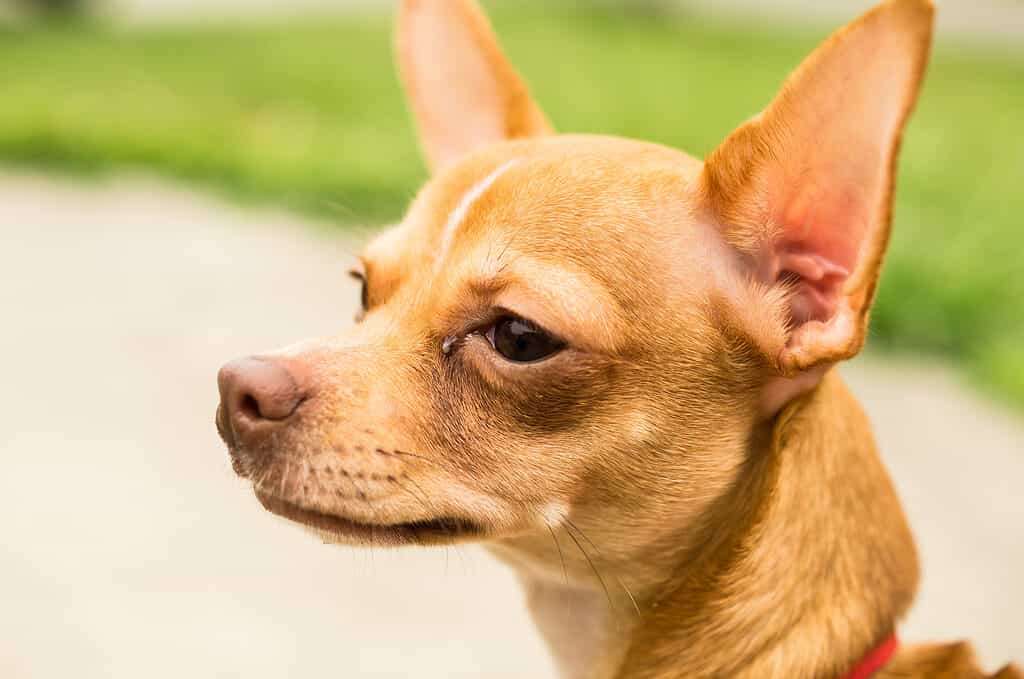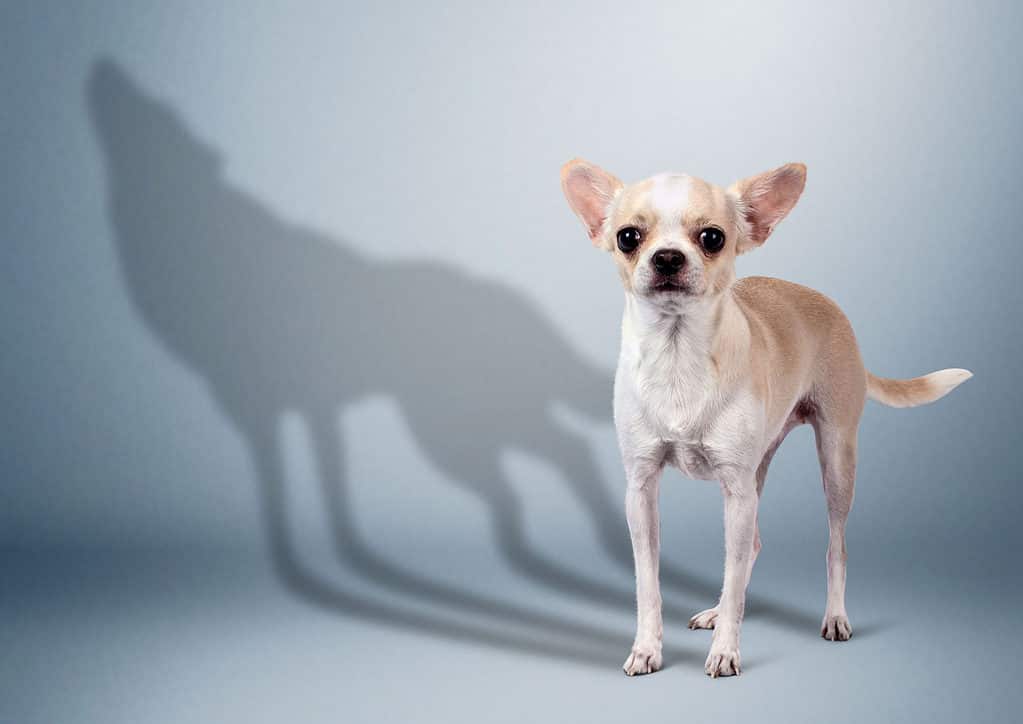Despite being among the very smallest dog breeds, the Chihuahua is packed with personality! But while Chihuahuas can be incredibly spunky, affectionate, and rewarding pets, they aren’t ideal for every household. Below, we’ll take an in-depth look at this unique breed. More importantly, we’ll cover everything you should know about their background, temperament, and what they need to thrive.
Chihuahua Breed Overview and History

The Chihuahua retains part of its genetic makeup from pre-contact dogs that crossed into North America from Siberia around 10,000 years ago.
©Toro_The_Bull – Arturelia/Shutterstock.com
The Chihuahua breed gets its distinctive name from the state of Chihuahua, Mexico. Although no Chihuahuas were officially registered with the AKC until 1904, the breed dates back to the 1500s!
As one of the oldest breeds in the Americas, the Chihuahua retains part of its genetic makeup from pre-contact dogs that crossed into North America from Siberia around 10,000 years ago. This distinct genetic signature only exists in one other breed: the Xoloitzcuintli, better known as the Xolo, a slender, hairless Mexican dog breed with similarly ancient roots. Notably, the Xolo was likely bred with the Techichi, a now-extinct small breed kept by the Toltecs, to eventually produce what we know today as the Chihuahua.
In fact, many 16th-century conquistadors’ accounts note how abundant tiny dogs resembling the Techichi were in the Chihuahua region at the time. Hernan Cortes, famed conquistador who was partially responsible for the fall of the Aztec empire, wrote that the Aztecs traded and sold the dogs for food. It was also customary for Aztec nobles to be buried with a ritually-slain Chihuahua. They believed the dogs would act as their spiritual guides through the afterlife.
Fast-forward a few hundred years, and the breed was no longer limited to Aztec nobility. Pet owners in the United States took notice of these compact, bold, and adorable canines. In the late 1800s, author Owen Wister imported a Chihuahua named Caranza. Caranza helped produce the breed’s original two variations, or strains: Meron and Perrito.
As mentioned earlier, the AKC officially recognized the breed in 1904 with a dog named Midget owned by H. Raynor of Texas. In 1923, the Chihuahua Club of America was founded, with the AKC designating it as the breed’s national parent club.
Chihuahua Size and Lifespan
As one of the world’s smallest dog breeds, the Chihuahua is ideal for pet owners with a more limited amount of space to work with. According to the AKC breed standard, the average fully-grown adult Chihuahua ranges from just 6 to 9 inches tall. Its typical weight range is between 4 and 8 pounds. However, to truly conform to the U.S. and U.K. breed standard, the ideal Chihuahua should be no more than 5.9 pounds.
At birth, Chihuahua puppies typically weigh only a few ounces–about 2.5 to 5.5 or so at most. However, they grow very quickly initially, with their growth rate tapering off slowly upon reaching six months of age. By three months old, most Chihuahua pups will reach at least a pound in weight. They generally will reach their full height at six to nine months old. They hit their maximum weight at around nine to 10 months old.
In addition to being one of the smallest dog breeds around, the Chihuahua also has one of the longest lifespans. Most individuals live to be 10 to 14 years old with optimal care. However, as a pure breed, it also has several common health issues to look out for. These mainly include cataracts, luxating patellas, and heart failure in older dogs. Staying up-to-date with your dog’s yearly vet check-ups (or every three to four months if your dog is still under a year old) can help you monitor for and address these issues if they arise.
Chihuahua Temperament and Aggression

Most Chihuahuas aren’t outright aggressive. However, they can be distrustful of strangers and tend to bark or snap at them at first.
©iStock.com/Dmytro Lastovych
In terms of its overall temperament, the Chihuahua is known for its independence, loyalty, sassy disposition, and dominant nature despite its small size. To be clear, they aren’t the type of dog to immediately make friends with everyone they meet. Still, though, they can be fiercely dedicated to their preferred person or people.
Most Chihuahuas aren’t outright aggressive. However, they can be distrustful of strangers and tend to bark or snap at them at first. This is important to remember if you have children in your home, as the breed is not ideal for very young children who are prone to mishandling or being unintentionally rough with their pets.
But for older children who can properly handle and appropriately respond to their dog’s behavior, a Chihuahua can be an excellent companion. This is because the breed is highly intelligent and responds well to a wide range of training methods. Remember, though, it can take time for Chihuahuas to trust and warm up to people close to them. For this reason, patience is necessary to truly bond with them.
If you have other dogs in your home, your Chihuahua will also take some time to get accustomed to them. Despite their highly independent nature, they fare quite well around other dogs with similar energy levels. Early (but gentle!) socialization and training are highly recommended. This will ensure things go smoothly as your dogs get to know one another. Do not force your Chihuahua into situations they are not comfortable with, as this can make them more distrustful and aggressive.
Do Chihuahuas Make Good House Pets?

You’ll need to prove to them you’re trustworthy and allow them to settle into their surroundings.
©iStock.com/lilu13
Are Chihuahuas good house pets overall? Like with most dog breeds, the answer to this depends on the dog’s particular owner and household. It’s important to select a breed that suits your lifestyle and preferences.
When it comes to the Chihuahua, patience is key as you slowly gain their trust. This is not the kind of dog that will immediately cuddle up with you and be your best friend the moment you bring them home. You’ll need to prove to them you’re trustworthy and allow them to settle into their surroundings.
As we briefly touched on earlier, this popular breed will not thrive in just any home. Generally, Chihuahuas should not live with young children who are not old or responsible enough to gently handle them with care and respect. Remember, it can take time for a Chihuahua to warm up to their housemates. Rowdy, noisy children can stress them out and cause them to display aggressive or even fearful behavior.
You should also avoid adopting one of these particular dogs if you aren’t able to ensure they get at least 30 minutes of exercise daily. For fully-grown Chi’s, two brief walks or runs each day is ideal. While they can thrive in a smaller space like an apartment, having a park nearby for them to stretch their legs and run around is important to their physical health. In the meantime, you should have interactive toys around to keep these highly intelligent dogs engaged mentally.
Finally, if you’re unable to stay up to date on their veterinary care and ensure at least yearly visits (or every three to four months in their first year), a pure breed like the Chihuahua is likely not ideal for you. Because they are prone to breed-specific health issues, closely monitoring for these issues is critical.
The photo featured at the top of this post is © iStock.com/PlatooStudio
Ready to discover the top 10 cutest dog breeds in the entire world?
How about the fastest dogs, the largest dogs and those that are -- quite frankly -- just the kindest dogs on the planet? Each day, AZ Animals sends out lists just like this to our thousands of email subscribers. And the best part? It's FREE. Join today by entering your email below.
Thank you for reading! Have some feedback for us? Contact the AZ Animals editorial team.






